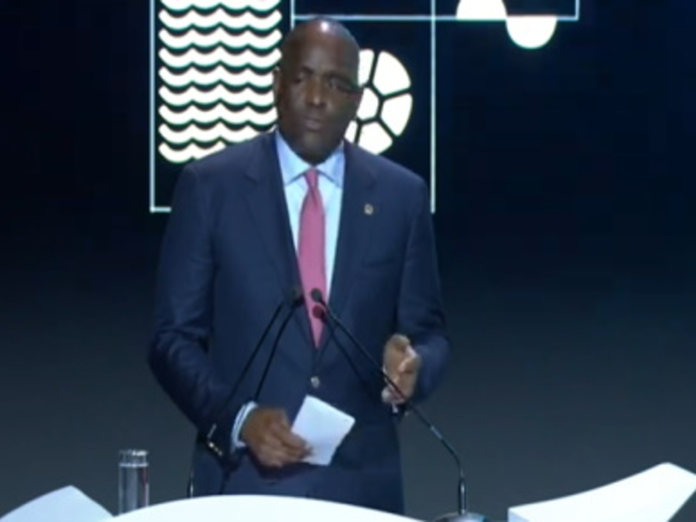
by STAFF WRITER
ATHENS, Greece, Apr 16, CMC – Caribbean Community (CARICOM) countries Tuesday called for a multi-lateral approach to the transition to a “Blue economy” to harness the advantages of a new balance between economic development, social cohesion, and sustainability.
In addition, the leaders of Dominica and Grenada said that such an initiative would also allow for the region to address some key challenges such as biodiversity loss, climate change, unsustainable fishing, marine pollution especially from plastics, and unsustainable maritime transport.
Addressing the ninth Our Ocean Conference here, Dominica’s Prime Minister Roosevelt Skerrit told delegates “Clearly there is a crisis and there is a need for urgent action.
“One of the important things we have to deal with in the world, especially the developed world is to reduce carbon emission…and unless we get a very clear decision to reduce carbon emission then we will be speaking and talking in futility,” Skerrit told the conference that is being held under the theme “Our Ocean – An Ocean of Potential”.
Skerrit told the delegates including representatives from non-governmental organizations, academia and the private sector that countries represented at the conference organized by the government of Greece do so “at the mercy of the developed world.
“We have been to many of these engagements …and we commend the government of Greece for hosting this important conference, but we need to see more concrete action taken.
“Everyone of us in the islands is taking action to mitigate against the impacts on our oceans, the impacts on our societies by climate change. But more needs to be done by the developed world.”
He said in Dominica’s case, the island last year declared the first sperm whale reserve in the world and that more than 45 percent of the country is protected as a forest reserve and 30 percent of the sea space is protected as a marine reserve.
“Interestingly one of the marine reserves is located in a fishing village and every one of the fishermen, every one of that community respects the law of the land in protecting the marine reserve.
‘So we have played our part, but there needs to be more advocacy and more action taken. We speak about the problem, but sometimes we don’t speak about the solutions to the problem,” Skerrit said, adding “I think the financing to put in place mitigation measures is needed now rather than later.
“Time is not on our side and we have to ensure we have a better society, a better planet, a better ocean for succeeding generations,” Skerrit told the two-day conference that the organizers said specifically address four aspects as horizontal elements cutting across the six areas of action of the conference.
In his address, Grenada’s Prime Minister Dickon Mitchell said he wanted to echo “the collective voices” of the Caribbean region whose identities are deeply woven into the tapestry of the Caribbean Sea and the Atlantic Ocean.
He reiterated Skerrit’s position that “we have a crisis” saying “To some extent we are preaching to the converted because…we are the ones grappling more than ever with the consequences of climate change, nature and biodiversity loss and pollution”.
He said in the face of those challenges, the conference has been told of the many initiatives being implemented by affected states, and “in the case of Grenada, I share for example our integrated coastal zone management policy, our non-biodegradable waste control act, our ban on single-use plastics and our blue economy roadmap”.
He said these initiatives “are a testament to our unwavering commitment to the sustainable utilization and development of our marine resources”.
Mitchell said these initiatives are also meant to fortify the island’s coastal resilience including concerted efforts in coral restoration and sustainable fisheries management.
“We are committed to preserving our marine heritage and advancing the sustainable development of our exclusive economic zone,” Mitchell said, adding “We made it a priority to continue to incorporate ambitious international sustainable plans as part of our commitment”
He reminded delegates that Grenada has stood on this platform in the past advocating for special circumstances for the global small islands of big ocean states.
“We shared as we are doing today many of the solutions we think could help in addressing this crisis,” he said, noting that “in the absence of multilateralism and perhaps more importantly, the absence of those who create the crisis, our success is going to be limited.
“And so I call upon us the big ocean states to ensure that we are united in our approach in making sure that those whose actions require to help us to tackle these issues are not made to walk away with commitments that are not implemented”.
He said Grenada will ratify several conventions including. the BBNJ (Beyond National Jurisdiction) High Seas treaty and will also advance negotiations of the plastic treaty at the upcoming conference in Canada as well as initiatives to be dealt with at the SIDS conference in Antigua and Barbuda in May this year.
“But I want to highlight in the absence of ensuring that our young people are intimately involved in this process we will not make progress,” he said, adding that Grenada in collaboration with UNESCO …is “pioneering a historic blue schools curriculum…starting in September to encourage marine literacy amongst our young people”.
Mitchell said he re-affirms Grenada’s commitment to multilateralism “in tackling the multiple crises facing our oceans, but as big island states we need the large land countries, creating this crisis to work hand in hand with us to tackle these challenges”.
CMC/gd/ir/2024

